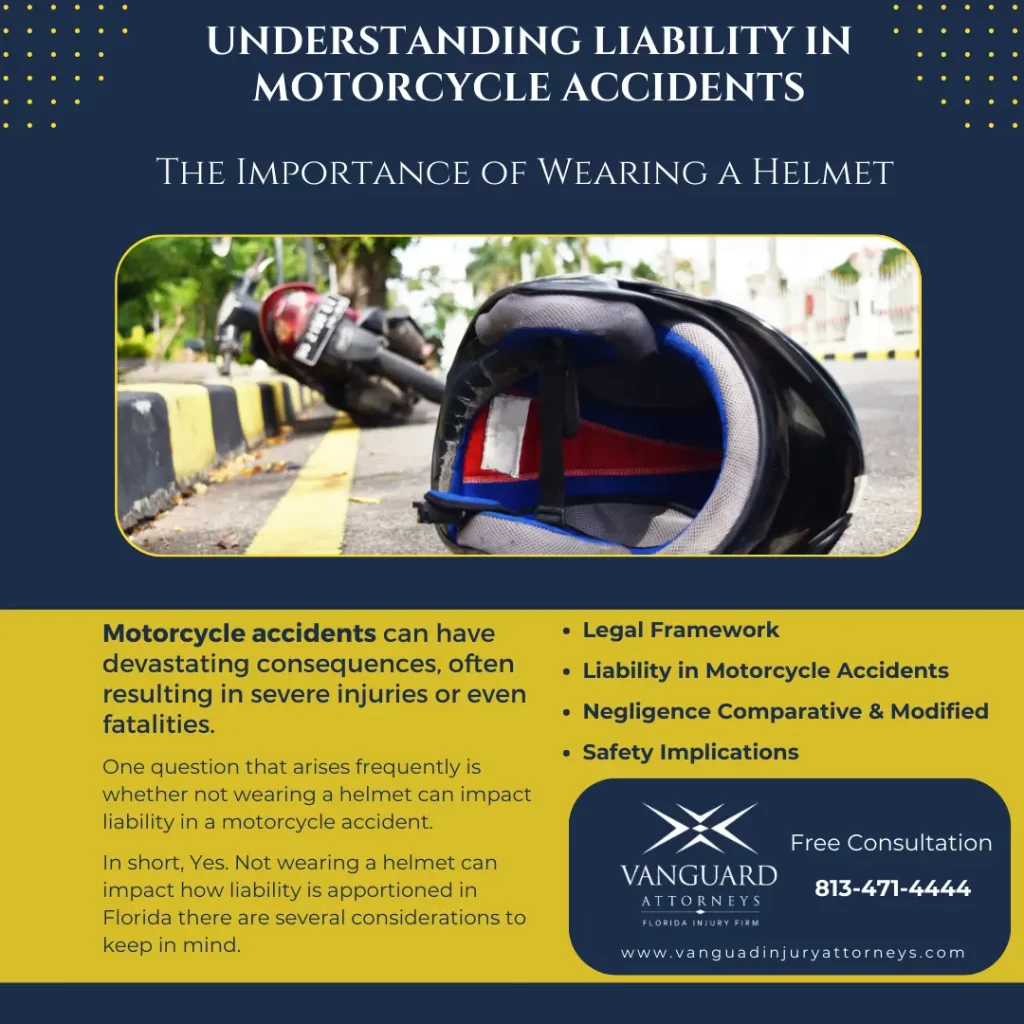Is a Motorcyclist Without a Helmet Liable in an Accident?
Get a Free Consultation
Motorcycle accidents can have devastating consequences for riders and there are often legal ramifications. Are drivers off the hook for hitting a motorcycle rider if they weren’t wearing a helmet? Can the absence of a helmet lead to increased liability for the rider? In this article, our Tampa motorcycle accident lawyers address these critical questions and delve into the relationship between helmet usage and rider liability in motorcycle accidents. Let’s explore the legal implications surrounding this hotly debated topic.
As a personal injury law firm serving Tampa, Brandon, and the entire Tampa Bay area, Vanguard Attorneys is committed to advocating for the rights of accident victims. One question that arises frequently is whether not wearing a helmet can impact liability in a motorcycle accident. The short answer is that yes, not wearing a helmet can impact liability in Florida, but there are several considerations to keep in mind.
Is it Legal to Ride A Motorcycle Without a Helmet?
Motorcycle helmet laws vary from state to state. Under Florida law, riders aged 21 years and older are not required to wear a helmet if they carry at least $10,000 in medical insurance coverage.
Determining Liability in Motorcycle Accidents
When determining liability in a motorcycle accident, several factors come into play. These factors may include the actions of the parties involved, road conditions, traffic laws, and more. It is crucial to understand that liability is not solely based on whether or not the injured party was wearing a helmet at the time of the accident. In most instances, it is the actions of the parties that have the greatest impact on liability rather than whether a helmet or safety equipment was in use.
Comparative Negligence vs. Modified Comparative Negligence
Historically Florida follows a pure comparative negligence system, which means that liability can be divided among the parties involved in an accident based on their respective degree of fault. Even if you were not wearing a helmet at the time of the accident, it does not automatically absolve the other party of their responsibility for causing the accident. Instead, the amount of compensation they can recover may be reduced by the percentage of fault assigned to them.
In 2023 the Florida Legislature passed and the Governor signed a bill that made many changes to laws related to personal injury cases, including those involving motorcycle accidents. One of those changes was to switch to modified comparative negligence where if the plaintiff is found to be 51% or more at fault they may not recover any damages. Motorcyclists from across Florida pleaded with lawmakers to make changes that would preclude defendants from blaming the plaintiff for not wearing a helmet, however, no change was made. Therefore if a jury determines that the plaintiff is 51% or greater at fault for failing to wear a helmet it is possible that in Florida a failure to wear a helmet could bar recovery.
As noted above this is a case-by-case situation that is greatly impacted by the specific facts of each case. Therefore if you are concerned that you may be barred by recovery for not wearing a helmet it is important to call our office and speak with one of our attorneys who specialize in representing injured parties after a crash.
The Danger of Not Wearing a Helmet
While our primary focus is on the legal aspects, it is crucial to emphasize the importance of wearing a helmet for your safety. Wearing a helmet significantly reduces the risk of head injuries and can save lives in the event of a motorcycle accident. By wearing a helmet, you are demonstrating a commitment to your own safety and responsible motorcycle riding. While the impact a helmet has on liability and legal proceedings may vary, one constant is that helmets do save lives.
In a motorcycle accident, liability is determined by various factors, including the actions of the parties involved, traffic laws, and road conditions. While not wearing a helmet may not directly impact liability, it can have implications for insurance coverage and the overall assessment of damages.
At Vanguard Attorneys, we understand the challenges faced by motorcycle accident victims, and we are dedicated to providing compassionate and effective legal representation. If you have been injured in a motorcycle accident, irrespective of whether or not you were wearing a helmet, we encourage you to consult with our team to understand your legal rights and options. Remember, your safety should always be a priority, so always wear a helmet while riding.
